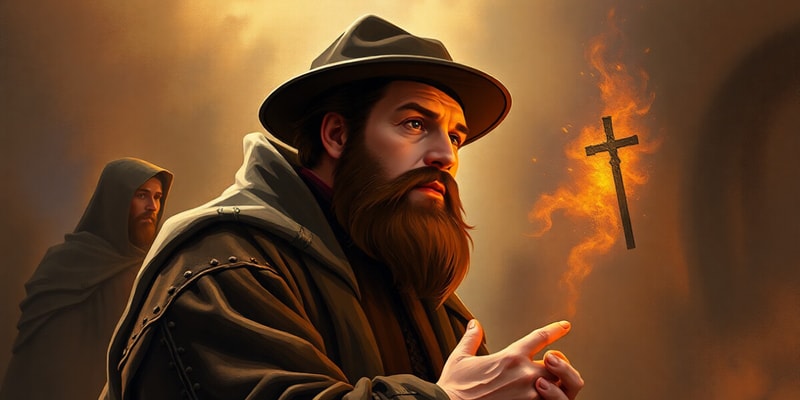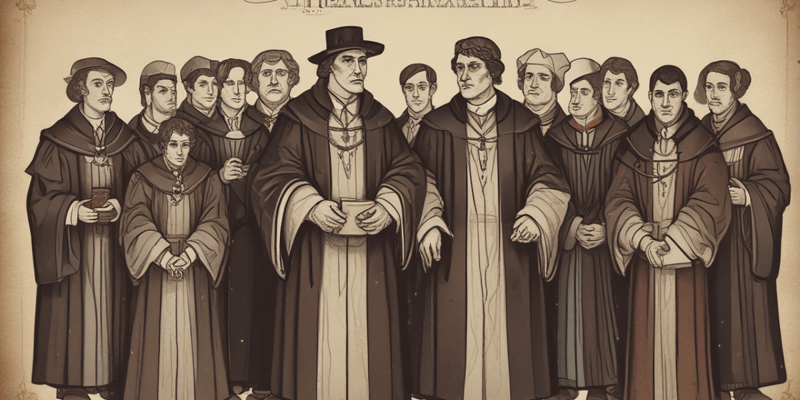Podcast
Questions and Answers
Match the following figures with their primary contributions or significance:
Match the following figures with their primary contributions or significance:
Ignatius of Loyola = Founded the Jesuits and wrote Spiritual Exercises Bartolome de las Casas = Advocated for the rights of indigenous peoples Abd al-Wahhab = Reformed Islamic practices and rejected idolatry Ibn Saud = Established a religious-political state in the Arabian Peninsula
Match the following movements or events with their descriptions:
Match the following movements or events with their descriptions:
Taqi Onqoy = Indigenous resistance movement in 16th-century Peru Pueblo Revolt = Uprising against Spanish colonial rule in New Mexico Tupac Amaru Revolt = Revolt against oppressive labor systems in Peru Thirty Years' War = Conflict between Catholic and Protestant states in Europe
Match the following treaties or acts with their impact or outcome:
Match the following treaties or acts with their impact or outcome:
Treaty of Westphalia = Established state sovereignty and religious choices Edict of Nantes = Granted limited rights to French Huguenots New Laws of 1542 = Sought to protect indigenous peoples in Spanish colonies St. Bartholomew's Day Massacre = Religious conflict leading to Huguenot persecution
Match the following terms with their definitions:
Match the following terms with their definitions:
Signup and view all the answers
Match the following historical figures with their nationality:
Match the following historical figures with their nationality:
Signup and view all the answers
Match the following uprisings with their leaders:
Match the following uprisings with their leaders:
Signup and view all the answers
Match the following historical events with their time periods:
Match the following historical events with their time periods:
Signup and view all the answers
Match the following concepts with their related events:
Match the following concepts with their related events:
Signup and view all the answers
Match the following groups with their beliefs or practices:
Match the following groups with their beliefs or practices:
Signup and view all the answers
Match the following figures with their contributions or beliefs:
Match the following figures with their contributions or beliefs:
Signup and view all the answers
Match the theologian with their associated theological works or ideas:
Match the theologian with their associated theological works or ideas:
Signup and view all the answers
Match the following movements or organizations with their goals:
Match the following movements or organizations with their goals:
Signup and view all the answers
Match the following terms with their Key figures:
Match the following terms with their Key figures:
Signup and view all the answers
Match the following beliefs with their originators or proponents:
Match the following beliefs with their originators or proponents:
Signup and view all the answers
Match the following events with their consequences:
Match the following events with their consequences:
Signup and view all the answers
Match the following movements with their geographic impacts:
Match the following movements with their geographic impacts:
Signup and view all the answers
Match the following ideas with their significance:
Match the following ideas with their significance:
Signup and view all the answers
Study Notes
Protestant Reformation and Counter-Reformation
- Martin Luther, a German monk, launched the Protestant Reformation in 1517, criticizing the Catholic Church's indulgences and challenging papal authority. Luther emphasized justification by faith alone, scripture over tradition, and the priesthood of all believers.
- John Calvin built on Luther's ideas, developing Calvinism, emphasizing God's sovereignty, predestination, and a disciplined life. Calvin's teachings spread widely in various regions.
- The Protestant Reformation was a major religious and political upheaval in 16th-century Europe, fragmenting the Catholic Church and introducing Protestant denominations. Key figures included Martin Luther and John Calvin.
- The Counter-Reformation or Catholic Reformation, aimed to respond to the Protestant Reformation. It involved internal reforms, like combating corruption and promoting education, and reaffirmed Catholic doctrines.
- The Council of Trent (1545–1563), a series of Catholic Church meetings, clarified Catholic doctrines, condemned Protestant ideas, and introduced reforms in areas like priestly training and the selling of indulgences.
Religious and Political Movements in the Americas and Europe
- The Society of Jesus (Jesuits), founded by Ignatius of Loyola in 1540, played a crucial role in the Counter-Reformation. They focused on education, missionary work, and opposing Protestantism.
- Taqi Onqoy was an indigenous resistance movement in 16th-century Peru, combining religious beliefs with anti-colonial sentiment.
- The Pueblo Revolt (1680) saw Pueblo peoples in present-day New Mexico revolt against Spanish rule, expelling the Spanish for over a decade.
- The Tupac Amaru Revolt (1780-1781) in colonial Peru, led by Tupac Amaru II, was fueled by indigenous grievances against oppressive labor systems.
- French Huguenots, French Calvinists, endured persecution from the Catholic monarchy, experiencing conflicts like the St. Bartholomew's Day Massacre before gaining limited rights.
Conflicts and Treaties
- The Thirty Years' War (1618–1648), initially a conflict between Catholic and Protestant states, developed into a wider European political struggle involving major powers like France, Spain, and Sweden. It brought significant devastation across Europe.
- The Treaty of Westphalia (1648) ended the Thirty Years' War and established the concept of state sovereignty. It allowed rulers to choose their state's religion (Catholicism, Lutheranism, or Calvinism), marking the dawn of modern international relations.
Reformers and Movements
- Bartolomé de las Casas, a Spanish priest, championed indigenous rights and condemned Spanish colonization's brutal treatment of native populations.
- Abd al-Wahhab, an 18th-century Islamic reformer, advocated for a return to early Islamic practices, rejecting innovations and idolatry. He allied with Ibn Saud.
- Wahhabism, a conservative Sunni Islamic movement emphasizing strict adherence to early Islamic teachings.
Leaders and Empires
- Ibn Saud partnered with Abd al-Wahhab to establish a religious-political state that evolved into modern Saudi Arabia.
- Popé led the Pueblo Revolt in 1680.
Studying That Suits You
Use AI to generate personalized quizzes and flashcards to suit your learning preferences.
Description
Explore the key events and figures of the Protestant Reformation and Counter-Reformation in this quiz. Delve into the teachings of Martin Luther and John Calvin, as well as the Catholic Church's response through the Council of Trent. Test your knowledge of this pivotal period in European history.


